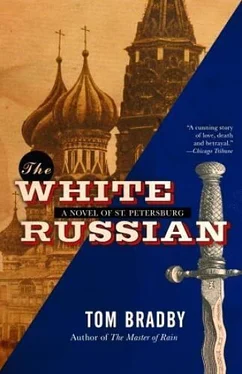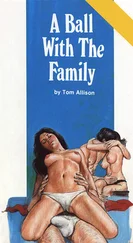“It is too, too late. It was too late a long time ago.”
“So you came to Petrovo to say goodbye?”
Maria did not answer.
“If I had not been married. If I had not turned away…”
“It was already too late for me, even then.”
Ruzsky pulled her gently toward him until her head rested upon his shoulder, her legs entwined with his. He lifted her face and held it as the tears rolled down her cheeks. “What can I do?” he asked.
Maria did not answer. He cradled her head upon his shoulder and rocked her as she cried. “It will be all right,” he whispered, but he knew that she did not believe him, and he wasn’t sure he believed himself.
He was tortured by the image of Borodin covered in the young man’s blood on that night at the factory, and of Maria bending before him to clean it from his clothes.
Could she really defeat this man?
“This will consume you,” he whispered.
“Sandro… This is my fate. It has chosen me, but it is also the one I have chosen.”
“This man has dragged you into his world. He will extinguish all the light your family once created. Is this what your father would have wished for you?”
“Do not speak of my father.”
“To abandon your sister…”
“Do not speak of them, Sandro.”
“Don’t leave Kitty to her fate.”
“Sandro, I beg you.”
“No, Maria. I beg you.” But he knew he had lost her. Maria’s sacrifice was not wild and hasty, but gentle and considered. This was her fate. The passion they had shared at Petrovo was fueled by the urgency of the condemned. “Please,” he whispered, his voice hoarse.
“You must let it run its course.”
“I cannot.”
“Nothing can change this, Sandro…”
She reached for him, her legs wrapped around his waist, her cheeks pressed to his. They touched each other with urgent desperation. Ruzsky kissed her cheeks and forehead and nose and eyes.
“Sandro,” she whispered. “My Sandro. I’m so sorry.”
Ruzsky crushed her to him.
“I’m so sorry,” she said again. “I would do anything for you, anything except this.”
Later, they stood and stared at each other in the darkness of the hallway.
Ruzsky knew he must leave, but could not. “I will try to stop you,” he said.
“Then we may both pay a terrible price.”
“For my father’s sake, for the sake of all that he stood for, I cannot allow their plans to continue uninterrupted.”
Ruzsky could not take his eyes off her. He was hardly able to breathe.
“Goodbye, Sandro.”
Ruzsky walked out into the stairwell.
He faced her. He could not bring himself to say goodbye.
Slowly, and without taking her eyes from his, Maria Bulyatina shut the door.
R uzsky slept fully clothed in Michael’s bed, and was awake long before dawn.
He pulled back the tiny curtain. It was still snowing heavily, the gas lamps dull orbs in a sea of swirling darkness. But Ruzsky could see the sled. Its occupant was still there, wrapped in blankets.
Ruzsky checked his watch. It was almost six. The day was Friday, but he could not be certain of the date.
He walked across the hall. Dmitri had not returned. He searched the bedrooms on the lower floors for good measure, and then took a few minutes to shave.
When he had finished, Ruzsky climbed back to the top floor and walked slowly through the rooms. He wished to take leave carefully of his childhood home today. He looked at his own room, then Ilya and Dmitri’s.
He went to his father’s bedroom on the first floor.
Ruzsky stared at the carnations, which had begun to wilt, and surveyed his father’s silver hairbrushes, neatly set out on top of the dresser. He felt like a ghost, drifting silently through a former life.
Ruzsky picked up the telephone in the hall and asked the operator to connect him to the Hôtel de l’Europe. “Madam Ruzsky,” he said.
“What room number, sir?”
“I’m not certain.”
After a momentary delay, he was connected and a sleepy voice answered.
“Ingrid?”
“Sandro.”
“I’m sorry to wake you.”
“What is it, Sandro?”
“I just… wanted to check you were all right.”
“We’re fine. Michael is still asleep.”
“Will you stay in the hotel today? I know it is hard, but if it is possible…”
“I’ll do my best.”
“Just stay inside if you can.”
“Have you seen Dmitri?”
“No.” Ruzsky tried to sound untroubled. “But I’m going to look for him now. There’s something I need to talk to him about. He’s probably staying in the barracks, or perhaps he’s taken a room at the yacht club.”
“Of course.”
“Go back to sleep.”
“Goodbye, Sandro.”
Ruzsky went to find one of his father’s thick woolen overcoats from the cloakroom and took a new sheepskin hat from the shelf. As he put them on, he glanced once more around the darkened hallway, his gaze resting upon the scabbard on the wall just inside the drawing room door.
He hesitated only a moment more and then walked forward and out into the street, the front door slamming shut behind him.
It was snowing harder than ever. An Arctic wind chafed his ears as it whistled down from Palace Square. Ruzsky pulled down the flaps of his hat and began to walk, his eyes half closed against the driving snow. At this time and in this weather, the city was deserted; his only company was his pursuer.
Ruzsky deliberately walked through the Summer Gardens, forcing the Okhrana man to leave the sled and follow him on foot.
At the iron gates to the main Preobrazhensky barracks opposite the Tavrichesky Garden, a sergeant in the guard box eyed him suspiciously before wiping away the condensation that had gathered upon his window and pulling it back. “Yes.”
“I’m looking for Major Ruzsky.”
“At this time in the morning?” He was one of the old school. On his top lip, he sported a long and elegant mustache with fine, waxed curls at its tips. He consulted his list. “No. Not present.”
“Has he been at all, during the night?”
“Do I look like his mother?”
“You haven’t seen him?”
“Who is asking?”
“His brother, Alexander Ruzsky.”
The man shook his head.
“Thank you, Sergeant.”
Ruzsky retraced his steps past the Summer Gardens, through Millionnaya Street, and across the lonely expanse of Palace Square to St. Isaac’s, the Astoria, and finally the yacht club. It was the same story here. The doorman knew Dmitri well-they all did. But he had not seen him for several days.
Ruzsky checked his watch once more before continuing on his cold and lonely walk down Morskaya, past the gilded window of the jeweler Fabergé, and the dusty premises of Watkins, the old English bookseller.
As he turned toward the Tsarskoe Selo Station, Ruzsky had almost forgotten that the man from the Okhrana was behind him, but when he looked around, he was only about twenty yards away. He had abandoned all pretense of concealment.
Waiting by the ornate gates of the Alexander Palace at Tsarskoe Selo little more than an hour later, Ruzsky pulled his coat tight around him. He was cold now, through to his core.
The palace grounds were deserted. The sentry had retreated to his box. In the building overlooking the gate, an officer of the palace police watched him.
Ruzsky tried to light a cigarette, but soon gave up. He had lost all feeling in his feet, and bashed his boots hard to try and restore it. His welcoming committee was taking a damned long time.
At length, the guard instructed him to proceed. He pointed at the near corner of the palace. “They are waiting,” he said.
Ruzsky began to walk, his head tipped forward against the wind.
Читать дальше












